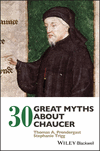CHAUCER RENOUNCED HIS WORKS ON HIS DEATHBED
Summary
Alongside Chaucer's dominant reputation as a cheerful poet with a wry and ironic sense of humor and an abiding love of humanity, there also persists a sense that he was writing somehow ahead of his time; that his apparent modernity was exceptional; and that sooner or later he would fall back under the “spell” of the medieval Church and its repressive institutions. In the long history of Chaucerian reception and biography, there are a number of imaginative scenarios that depict Chaucer's death and speculate about the circumstances in which he may have written the Retraction. The most famous dramatization of Chaucer's death was written by Thomas Gascoign, the Chancellor of Oxford University. Whatever his sources or his motivations, Gascoigne's passage set the tone for a number of similar fantasies about Chaucer's deathbed penitence, usually framed as critical or textual studies of the retraction.



